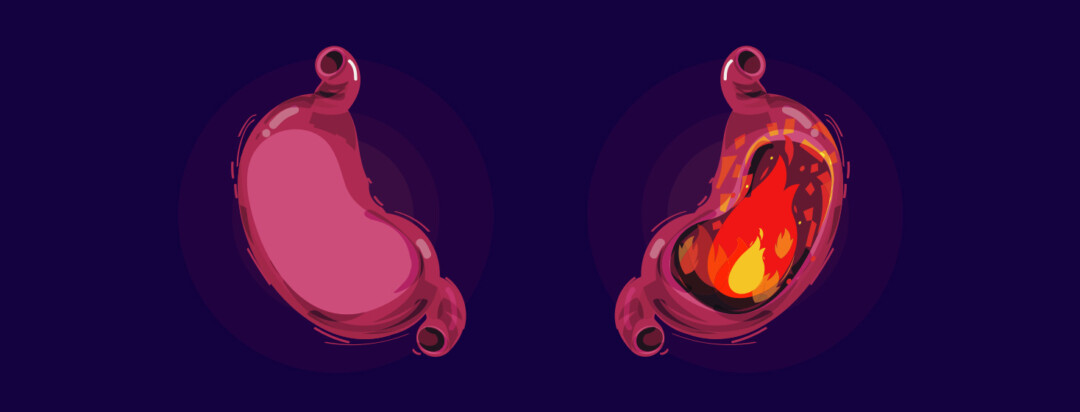IBS and GERD: Two Digestive Disorders with a Common Root Cause
Unfortunately, the digestive dilemmas I face are not only those related to my IBS. I also suffer from GERD (otherwise known as gastroesophageal reflux disease) and have for as long (and in fact, a little longer) than I have had IBS. While these two disorders likely have some common causes and share several of the same triggers, they also diverge in many ways. This can be frustrating to deal with, as some foods and supplements that soothe my IBS can actually trigger my GERD and vice versa. This means having both disorders have led me to embark on a journey of trial and error to find the best balance so that my entire digestive system can be as content and flare-free as possible.
My first experience with GERD
My first run-ins with GERD actually pre-dated my IBS diagnosis by several years. During my sophomore year of high school, I started suffering from frequent panic attacks and overall anxiety issues that also seemed to kickoff episodes of heartburn and acidic stomach. I think I was probably the only teenager in my 10th grade class that always carried around a roll of Tums and had a back-up bottle of Maalox in her locker.
Learning to deal with GERD
Luckily, as I dealt with and began to better manage my anxiety with the help of therapy and delving into the theater as a distraction, my panic attacks began to abate. And with that, my heartburn mostly receded for the rest of high school and into early college. However, about midway through college, I started to again experience heartburn and reflux around the same time my IBS symptoms first manifested. Unlike the IBS, the reflux was more sporadic at the time, so it took a backseat to my IBS among my health concerns. But like my IBS, the GERD now seemed to have less to do with stress and anxiety (though these definitely exacerbated both disorders) and more to do with things like diet, sleep and other health complications.
Community Poll
On an average day, how would you rate your level of anxiety related to IBS?
Balancing IBS and GERD
Since I was focused on getting my IBS under control in college, I would sometimes accidentally trigger my GERD in the process. In particular, I learned the hard way that peppermint--while very soothing for IBS--actually gave me fierce and painful reflux for many hours afterwards. Ginger also could be problematic for my GERD if I took too much of it at once, even as it quelled my overall queasiness. Likewise, many treatments for my GERD actually upset my IBS. Both Proton Pump Inhibitors (or PPIs, known as Prilosec, Nexium, etc.) and H2 histamines blockers (like Zantac) aggravated my IBS.
I am sure I am not the only one who has struggled to achieve a balance between both disorders, as several studies have found a link between GERD and IBS. Specifically, a 2010 study published in the World Journal of Gastroenterology revealed that 63 percent of those diagnosed with IBS also had GERD symptoms out of a survey sample of 6,000 patients.1 Additionally, the study also concluded that both GERD and IBS was more common among women, and that having both conditions actually made all the symptoms worse. Research seems to indicate that both disorders share a root cause of sluggish motility in the digestive tract, as well as a predisposition toward sensitivity with certain foods.
Pinpointing GERD and IBS triggers
In my case, I was able to finally pinpoint some common triggers associated with both disorders and either minimize or altogether eliminate them, in my diet. For me, one of the biggest culprits was coffee, so it had to go. While I was sad to give up my greatest vice, the decrease in symptoms ultimately far outweighed the cost. I also realized alcohol contributed to both IBS and GERD symptoms. As such, I make sure to only have one drink in a sitting and not more than a few times a week, while also skipping weeks when my digestive system is more sensitive (right before and during my period, for instance). I also find some kinds of alcohol bother me more than others (red wine, harder liquor, etc.) and mostly avoid those, and NEVER have a drink on an empty stomach.
I also find very fatty/fried and spicy foods also aggravate both my IBS and GERD, so I tend to avoid them whenever possible. On the other hand, I have found some foods, like bananas, low/no-dairy mashed potatoes, rice with steamed veggies and roasted root vegetables--tend to have a soothing effect on both my upper and lower digestive tract. I no longer take PPIs or H2 blockers. Instead, I take DGL supplements before many of my meals and use alginic acid tablets before bed, which form a foam barrier in my stomach that prevents acid from rising into the esophagus while I sleep and usually doesn't irritate my IBS. I also rely on a wedge pillow to temper reflux attacks in the middle of the night. And finally, I found that a warm heating pad can be used to calm both my low belly, as well as can be placed right under my left rib cage to relax a churning stomach.
An ongoing process
While it's still an ongoing process I have yet to perfect, I think I am striking a pretty good balance in addressing the symptoms of both my GERD and IBS and hope to identify more beneficial foods and lifestyle modifications in the future.
Community Poll
Does your IBS prevent you from attending public events?

Join the conversation